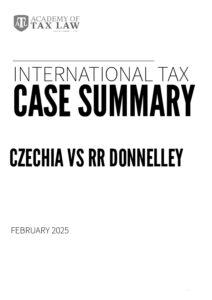Czech Republic vs RR Donnelley: CASE SUMMARY
Home » Case Library »
Czech Republic vs RR Donnelley: CASE SUMMARY
Case Information
- Court: Supreme Administrative Court (SAC) of the Czech Republic
- Case No.: 7 Afs 31/2024 – 27
- Applicant: RR Donnelley Czech s.r.o.
- Defendant: Odvolací finanční ředitelství (Czech Tax Appeals Directorate)
- Judgment Date: 28 February 2025
- Download the FULL JUDGMENT
Judgment Summary
The case Czech Republic vs. RR Donnelley Czech s.r.o. revolved around a transfer pricing dispute concerning the application of Section 23(7) of the Czech Income Tax Act (ITA). The core issue was whether RR Donnelley Czech s.r.o. had correctly applied the arm’s length principle in a transaction involving the purchase of hard disk drives (HDDs) on behalf of Banta Ireland, a related entity.
The Specialised Tax Office initially assessed RR Donnelley Czech for an additional corporate income tax liability of CZK 61,650, along with a 20% penalty of CZK 12,312, arguing that the transaction had not been conducted at arm’s length. The company appealed to the Regional Court in Brno, which annulled the tax authority’s decision, citing insufficient justification for the reference price used by the tax administration.
The Czech Tax Appeals Directorate (Odvolací finanční ředitelství) then challenged the Regional Court’s decision before the Supreme Administrative Court (SAC). The SAC dismissed the appeal, upholding the lower court’s finding that the tax authorities failed to establish a valid reference price and did not conduct an adequate comparability analysis.
The core arguments in the case centered around the methodology used to determine a reference price. The tax authorities applied the USD LIBOR rate to determine an appropriate interest rate for the transaction, arguing that the purchase of HDDs was essentially a risk-free financial arrangement. RR Donnelley Czech, however, challenged this, arguing that:
- The transaction was not risk-free, as the company was involved in manufacturing activities and held inventory as part of its operational business model.
- The USD LIBOR rate was inappropriate, as neither RR Donnelley Czech nor Banta Ireland were banking institutions engaged in short-term interbank transactions.
- The tax authorities failed to conduct a proper benchmarking study, and their approach lacked economic justification.
The Supreme Administrative Court ruled in favour of RR Donnelley Czech, concluding that the tax authorities had not provided adequate reasoning to justify their adjustments. The absence of comparable transactions should have led the tax administration to either conduct a more thorough economic analysis or select an alternative benchmarking method. The court reiterated that under Czech law, the burden of proof lies with the tax administration when making transfer pricing adjustments.
By dismissing the appeal, the SAC confirmed that the tax authority’s decision was unreviewable due to lack of reasoning, reinforcing the need for tax authorities to adhere to robust transfer pricing documentation and comparability analysis standards.
The judgment is significant because it highlights:
- The importance of proper benchmarking and comparability analysis in transfer pricing disputes.
- The role of the courts is to ensure tax authorities follow appropriate methodologies when assessing intra-group transactions.
- The limitations of using financial reference rates like USD LIBOR in non-financial transactions.
RR Donnelley Czech was awarded legal costs of CZK 4,114, to be paid by the tax authority within 30 days. The ruling cannot be appealed, making it a final decision in the dispute.

